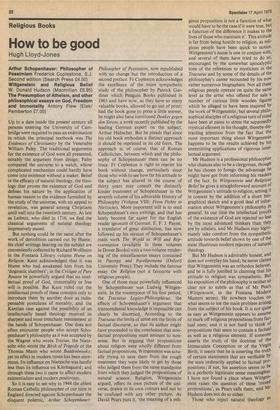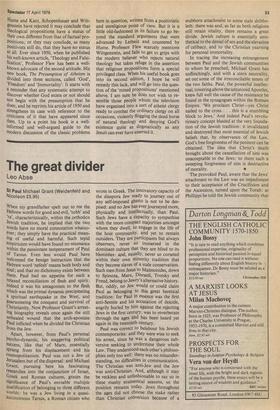Religious Books
How to be good
Hugh Lloyd-Jones
Arthur Schopenhauer: Philosopher of Pessimism Frederick Coplestone, S.J. Second edition (Search Press £4.50) Wittgenstein and Religious Belief W. Donald Hudson (Macmillan £6.95) The Presumption of Atheism, and other philosophical essays on God, Freedom and Immortality Antony Flew (Elek/ Pemberton £7.00)
Up to a date inside the present century all persons entering the University of Cambridge were required to pass an examination in which the principal textbook was The Evidences of Christianity by the Venerable William Paley. The traditional arguments for the existence of God were all presented, notably the argument from design; Paley compared the universe to a watch, whose complicated mechanism could hardly have come into existence without a maker. Belief in the efficacy of natural theology, the theology that proves the existence of God and defines his nature by the application of human reason to the evidence furnished by the study of the universe, with no appeal to revelation, was general among Christians until well into the twentieth century. As late as Leibniz, who died in 1716, we find the classical arguments of natural theology impressively stated.
But nothing could be the same after the work of demolition carried out by Hume; his chief writings bearing on the subject are conveniently collected by Richard Wollheim in the Fontana Library volume Hume on Religion. Kant acknowledged that it was Hume who had awakened him from his 'dogmatic slumbers' ; in the Critique of Pure Reason he powerfully argued that no intellectual proof of God, immortality or free will is possible. But Kant ruled out the intellectual proofs of these concepts only to introduce them by another door as indispensable postulates of morality, and the Kantian case against the possibility of an intellectually based theology received its sharpest and most trenchant restatement at the hands of Schopenhauer. One does not often encounter people who accept Schopenhauer's philosophy as it was accepted by the Wagner who wrote Tristan, the Nietzsche who wrote the Birth of Tragedy or the Thomas Mann who wrote Buddenbrooks; yet its effect in modern times has been enormous. Its influence on Nietzsche was hardly less than its influence on Kierkegaard; and through these two it came to affect modern existentialism and modern positivism.
So it is easy to see why in 1944 the ablest Roman Catholic philosopher of our time in England directed against Schopenhauer the eloquent polemic, Arthur Schopenhauer: Philosopher of Pessimism, now republished with no change but the introduction of a second preface. Fr Copleston acknowledges the excellence of the more sympathetic study of the philosopher by Patrick Gardiner which Penguin Books published in 1963 and have now, as they have so many valuable books, allowed to go out of print; had the book gone to press a little sooner, he might also have mentioned Denker gegen den Strom, a work recently published by the leading German expert on the subject, Arthur Hiibscher. But he pleads that since his old book embodies a distinct approach it should be reprinted in its old form. The approach is, of course, that of Roman Catholicism, between which and the philosophy of Schopenhauer there can be no truce. Fr Copleston is right to reprint his book without change, particularly since those who wish to see how far his attitude to the subject has altered in the course of thirty years may consult the distinctly kinder treatment of Schopenhauer in the seventh volume of his admirable History of Philosophy (Volume VIII: From Fichte to Nietzsche). More important still is to read Schopenhauer's own writings, and that has lately become far easier for the English reader ignorant of German. E. F. J. Payne, a translator of great distinction, has now followed up his version of Schopenhauer's main work The World as Will and Representation (available in three volumes in Dover Books) with a two-volume rendering of the miscellaneous essays contained in Parerga and Paralipomena (Oxford University Press). They include the famous essay On Religion (not a favourite with religious people).
One of those most powerfully influenced by Schopenhauer was Ludwig Wittgenstein. In the masterpiece of his first period, the Tractatus Logico-Philasophicus, the effects of Schopenhauer's argument that transcendental knowledge is impossible can clearly be discerned. According to the Tractatus the limits of sense are the limits or factual discourse, so that its author might have proceeded to the conclusion that nonfactual propositions must amount to nonsense. But in arguing that propositions about religion were wholly different from factual propositions, Wittgenstein was actually trying to save them from the rough treatment they were likely to get by those who judged them from the same standpoint from which they judged the propositions of natural science. Religion, Wittgenstein argued, offers its own picture of the universe, drawn in its own colours and not to be confused with any other picture. As David Pears puts it, 'the meaning of a reli gious proposition is not a function of what would have to be the case if it were true, but a function of the difference it makes to the lives of those who maintain it'. This attitude is far from being hostile to religion, as religious people have been quick to notice. Wittgenstein's name is one to conjure with, and several of them have tried to do so, encouraged by the somewhat apocalyptic tone of the references to mysticism in the Tractatus and by some of the details of the philosopher's career recounted by his now rather numerous biographers. Not all these religious people operate on quite the same level as the artist who offered for sale a number of curious little wooden figures which he alleged to have been inspired by the work of Wittgenstein; but several philosophical disciples of a religious turn of mind have been at pains to stress the supposedlY mystical element in his thought, thereby distracting attention from the fact that the most important thing about Wittgenstein happens to be the results achieved by his unremitting applications of rigorous intellectual argument. Mr Hudson is a professional philosopher who chances also to be a clergyman, though he has chosen to forego the advantage he might have got from informing his readers of the fact. In Wittgenstein and Religious Belief he gives a straightforward account of Wittgenstein's attitude to religion, setting it in context by the addition of a short biographical sketch and a good deal of information about Wittgenstein's philosophy in general. In our time the intellectual proofs of the existence of God are rejected no less by the most advanced thinkers than they are by atheists, and Mr Hudson may legitimately take comfort from the sympathetic attitude towards belief shown by one of the most illustrious modern rejecters of natural theology. But Mr Hudson is admirably honest, and does not overplay his hand; he never claims that Wittgenstein was an orthodox believer, and he is fully justified in claiming that his attitude to religion was sympathetic. But his exposition of the philosophy is neither so clear nor so subtle as that of Mr Pears (Wittgenstein, in the Fontana Modern Masters series). He nowhere touches On what seems to me the main problem arising from the subject of his book. It is not quite as easy as Wittgenstein appears to assume to mark off religious propositions from factual ones; and it is not hard to think of propositions that seem to contain a factual as well as a religious element. If someone asserts the truth of the doctrine of the Immaculate Conception or of the Virgin Birth, it seems that he is asserting the truth of certain statements that are verifiable by the tests ordinarily applied to factual propositions; if not, his assertion seems to be in a perfectly legitimate sense meaningless. I have not found a place where Wittgenstein raises the question of these `mixed propositions', as Pears calls them, and Mr Hudson does not do so either.
Those who reject natural theologY as
Hume and Kant, Schopenhauer and Wittgenstein have rejected it may conclude that theological propositions_ have a status of their own different from that of factual proPositions; or they may conclude, as many Positivists still do, that they have no status at all. Ever since 1950, when he published his well-known article, 'Theology and Falsification', Professor Flew has been a wellknown advocate of the second attitude. His new book, The Presumption of Atheism is divided into three sections, called 'God', 'Freedom' and 'Immortality'. It starts with a.reminder that any systematic attempt to discover whether God exists or not should not begin with the presumption that he does; and he reprints his article of 1950 and strengthens its case with reference to the criticisms of it that have appeared since then. Up to a point his book is a wellinformed and well-argued guide to the modern discussion of the classic problems here in question, written from a positivistic and unreligious point of view. But it is a little old-fashioned in its failure to go beyond the standard arguments that were advanced by Leibniz and countered by Hume. Professor Flew scarcely mentions Wittgenstein, and fails to get to grips with the modern believer who rejects natural theology but takes refuge in the assertion that religious propositions form a special privileged class. When his useful book goes into its second edition, I hope he will remedy this lack, and will go into the question of the 'mixed propositions' mentioned above. I am sure he does not wish to resemble those people whom the television have organised into a sort of atheist clergy ready to combat the ordinary clergy on all occasions, violently flogging the dead horse of natural theology and denying God's existence quite as dogmatically as any Jesuit can ever have asserted it.



































 Previous page
Previous page